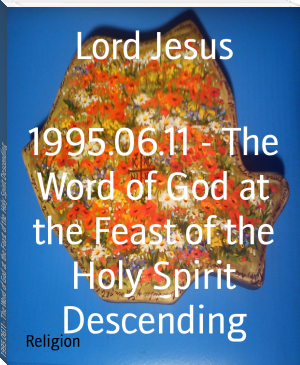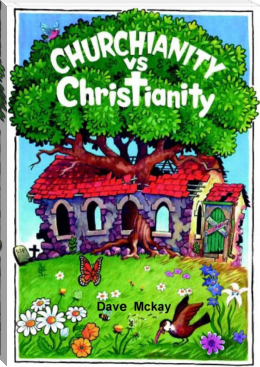Listening - Dave Mckay Mckay (best free ebook reader for pc .TXT) 📗

- Author: Dave Mckay Mckay
Book online «Listening - Dave Mckay Mckay (best free ebook reader for pc .TXT) 📗». Author Dave Mckay Mckay
Listening
by Dave McKay
davidmckayjc@gmail.com
Copyright 2008 Dave Mckay
Smashwords Edition
Smashwords Edition, License Notes
Thank you for downloading this free ebook. You are welcome to share it with your friends. This book may be reproduced, copied and distributed for non-commercial purposes, provided the book remains in its complete original form. If you enjoyed thisbook, please return to Smashwords.com to discover other works by this author. Thank you for your support.
ISBN: 9781301263516
1. The Monster is Dead
2. The Holocaust
3. The Vaishnu Sect
4. Those Eyes
5. Baxter Detention Centre
6. Listening
7. Clearness
8. Trouble in India
9. Dodge City
10. Threshing
11. Policy Changes
12. Macquarie University
13. A Gathered Meeting
14. Reaching Out
15. Chaim Learns to Hear
16. The Cornerstone
17. Free Work
18. Listening to Whom?
19. Hate
20. Love
21. Business
22. The Mahdi
23. Unity
24. Abounding
25. Sheree Returns
26. Co-operation
27. Betrayal
28. The Cross
29. Two Witnesses
30. Using the Media
31. Forecasting
32. An Open Confrontation
33. A Warning Unheeded
34. The Big One
35. The Monster
36. The Witnesses are Killed
Other Books by Dave Mckay
The Monster is Dead
Chapter One--The Monster is Dead
The news of his execution was flashed all over the world, and everywhere it was greeted with celebrations. Chaim Judah Rosenberg, the notorious endtime prophet, was dead -- shot through the head by a young Israeli sniper. Killed with him was his partner in crime, Rayford Strait. Strait, too, had been shot in the head by the same soldier.
In the week before their execution they had, on two occasions, publicly burned to death people who had tried to arrest them. These were the final victims in a three-year worldwide reign of terror by the two desperadoes.
Chaim had been dubbed the "smiling assassin" because of his apparent indifference to the suffering that he inflicted on anyone who dared to challenge him. It is estimated that more people died as a result of these two men than had died during all of the genocides in history.
Authorities had been working for years to bring the pair to justice, but they had slipped through every dragnet that was thrown around them, often killing dozens of law enforcement personnel in the process.
Chaim and Rayford were leaders of a tiny cult of religious fanatics whose members were so totally under their control that it was said that they would gladly betray their own families and even lay down their own lives at the behest of either Rosenberg or Strait.
Some news reports, reflecting on the long-awaited deaths of the notorious cult leaders, sought to unravel the mystery of their twisted lives. Chaim, in particular, interested the public, because he had started out as a peace-loving liberal Quaker just a few years earlier, a man of tolerance and love. But in a few short years he had evolved into an evil, perverted monster. What had caused him to change so dramatically, and what had been going on inside his own head to have led him to such a tragic end?
This book is an attempt to tell Chaim's story.
(Table of Contents)
Chapter Two--The Holocaust
Chaim looked deep into the lifeless blue eyes of the child that lay on the ground in front of him. She would have been only about six years old. Long ringlets of golden hair stirred in a gentle breeze around her tiny horror-stricken face. Her frilly white dress was covered in blood. There was in her face all the innocence of childhood, and yet Chaim sensed in her death all the worst of human depravity as well.
Around her lay other bodies, stretching for as far as he could see. But this one child was the only one on whom he could focus. Her face and her death embodied the suffering of each individual in a disaster that could not be comprehended through the use of numbers alone. He understood that she was part of the greatest destruction of human life that had ever occurred on earth. Millions had been killed overnight. Exactly how they had died was not clear, nor was it clear how Chaim had escaped. In fact, it was not even clear what country he was in. All that mattered was the awfulness of what lay in front of him, and his own feeling of helplessness.
Deep sobs wracked his body, though he cried silently. He was overcome with grief and compassion, but he was also overcome with a feeling of personal responsibility, like all of this was his fault, or perhaps like there was something he could do to ease the suffering, but he did not know what it was. Tears began to form in his eyes.
And then he awoke.
Three nights in a row the same dream had come to him. It was just a dream; and Chaim was intelligent enough to know that it would go away eventually.
Still, during the past two days, those innocent blue eyes had returned to his thoughts over and over, to haunt him even during his waking hours. The feeling was one of revulsion at whatever had caused this, but there was also a feeling of great despair over what to do about it. Being only a dream, of course, it was not possible to do anything; and so Chaim, in his own way, would shake it off by having a laugh at himself for being so obsessed, and then just wait for it to fade from his memory.
There was a protest rally that afternoon to attend, and then the flight to catch tomorrow morning, and so Chaim turned his attention to these and other events of the day.
Chaim Judah Rosenberg was in his late fifties, grey-haired, short, plump, good-natured, and single. He was a lecturer in comparative religions at the University of Newcastle, and a faithful member of the Religious Society of Friends (Quakers) for the past 18 years.
Although respected for his knowledge of all the world’s great religions, Chaim's speciality was new religious movements. He had been invited to participate as the Australian Quaker representative at an interfaith conference to be held in Chennai, India, starting that weekend. The university had gladly given him leave to attend.
Friends (as Quakers are known amongst themselves) recognised Chaim as a competent, honest, and humble representative on any body that he had been appointed to. His Jewish faith had not been a problem with Friends in Australia, where the movement tolerated people of all beliefs on the basis of their willingness to “walk in the Light”. Not even amongst his most liberal Jewish relatives and friends had he found such broad-mindedness as he had found amongst the Quakers. He knew, when he had known them for only a short while, that this was to be his spiritual home.
Defending the rights of Aborigines was another one of Chaim’s (and the Society's) interests, and that was the purpose of the protest that he was planning to attend that afternoon.
The Australian Government had been becoming progressively more militant in its attitude toward refugees, minority religions, and now toward Aborigines. In a perversion of the concept of “equal rights”, funding had been taken away from a long list of Aboriginal bodies. The argument was that special treatment for Aborigines was making them more equal than others. In keeping with this approach, legislation which had originally been brought in to protect Aboriginal rights was now being rescinded. The concept of “one nation”, which had been condemned as racist when it was first raised so many years earlier, was now being touted as the answer to just about all of Australia’s problems. Flag-waving and patriotic fervour were gripping the nation, and any minorities who objected were seen as being un-Australian. Friends in general were a part of the minority who opposed the present political trend.
The demonstration that afternoon was low-key and peaceful. Members of the peace movement had planned it without the usual support of various socialist groups who seemed more interested in confrontations with authorities than with reconciliation. This candlelit vigil under the clock tower on Beaumont Street was well attended and almost awesome in its complete silence. It had been advertised as an hour of mourning for the loss of yet another right for Aborigines, that of being able to hunt and fish without licences.
With a lit candle in one hand, and with the other hand supporting a poster that stood on the ground in front of him, Chaim looked out at the people walking by. And then the innocent blue eyes reappeared in his mind. The image was so powerful that it threatened to destroy his purpose for being there; fishing rights seemed like such a minor issue compared to the holocaust that the little girl represented.
Chaim passed his sign to someone nearby who did not have one, and he retreated to the back of the group. The burning candle was still in his hand as he seated himself on a bench beside an elderly, wrinkled Aboriginal woman. He had seen her at a number of other rallies, although he had never spoken to her personally. She was simply known as Aunty Molly, and it always seemed to be her job to look after the children while others took part in the protests. Chaim smiled toward her and then bowed his head, to look into the flame of the candle.
The little girl, lying there on the ground, seemed almost as real to him at this moment as she had in the dream. Tears started to form in his eyes, and he fought to hold them back. In front of him was the real world with its real needs, he reminded himself. Why was he letting himself become so distracted by something that existed only in his imagination?
“You ben dreamin',” said Aunty Molly in a quiet voice which was both smooth and raspy at the same time. In the total silence of the demonstration her words almost echoed inside his head, although, in reality, they were little more than a whisper. "You ben dreamin'." Her voice went neither up nor down at the end. She said it as a question, but she also said it as a statement of fact, as though she already knew the answer.
Molly had not turned her head, and she too was looking down toward the ground, so Chaim was tempted to pretend he had never heard the question. After all, she had no way of knowing what was going on in his mind. Maybe she was talking to one of the children playing nearby.
“Best you listen to it,” she said, after a moment’s silence.
“Are you talking to me?” Chaim asked.
“It’s not me talkin’,” said Aunty Molly. “It’s the spirit. No need to answer me.”
And that was it.
(Table of Contents)





Comments (0)